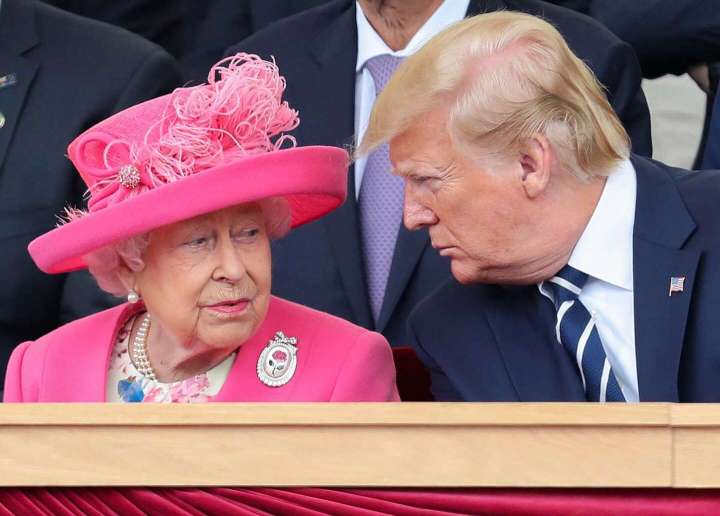For me, the most striking aspect of Queen Elizabeth II’s 70-year reign was her iron determination to be boring. In those seven decades, she very rarely let slip her views about any of the great political and public events over which she presided. She has never even hinted at her views on any of the glittering public figures with whom she dealt. We don’t know what she thought about Donald Trump or Barack Obama or Margaret Thatcher. And we never will. Elizabeth was the most disciplined public figure of the past century.
Queen Elizabeth decided to be boring — for Britain’s sake

In a confessional age, when we post every idea, urge, impulse and image that pops into our heads, this woman kept her own counsel. As Tina Brown, author of the fascinating book “The Palace Papers,” notes, Elizabeth was careful even at her own family’s weddings and funerals, rarely smiling or weeping, always maintaining dignity and the appearance of detachment. That was her interpretation of her role as a constitutional monarch, one who leads all the people and never takes sides, and she played it better than anyone ever has. Even during the contentious debate over Brexit, she never let slip her own preferences. (Then-Prime Minister David Cameron had to apologize in person for revealing that she was pleased that Scotland voted down independence in its own referendum.)
It’s easy to think of Britain’s royal family as leading a charmed life. They get to live in grand palaces, enjoying the world’s attention and, for the most part, adulation. That is all true. But the queen demonstrated the other side of that coin: that doing it right, fulfilling one’s duty, can be hard and unsparing in its own way. An endless stream of public duties, large and small, must be fulfilled. Above all, it requires an abnegation of the self.
In a way, the odyssey of Harry and Meghan, the Duke and Duchess of Sussex, reveals the challenge of the modern monarchy. Separate and apart from the incendiary charges of racism that they leveled against other royals, they seemed to chafe at the life of ribbon-cuttings and provincial visits, particularly given that, as minor royals, they were destined to live a comparatively modest life. (That’s reportedly why Prince Andrew was always hanging around rich people, hoping for a handout or more.) Given their fame, Harry and Meghan appear to have realized that they could break out, cash in and enjoy much greater affluence with far more personal freedom — and so they did. But they were acting as individualists, maximizing their satisfaction. The queen acted as an institutionalist, preserving the stature of the British government.
The 19th-century writer Walter Bagehot famously wrote that any constitutional system needs two parts — one “dignified,” the other “efficient.” One to awe the public and the second to make government work. Elizabeth perfectly exemplified the dignified aspect — something we in the United States could use more of in our constitutional system.
Follow Fareed Zakaria‘s opinions
FollowThe U.S. president is simultaneously the head of government and the head of state. That combination has its advantages. It fuses power and prestige and makes the chief executive a commanding presence on the world stage. But it also can demean the office and American democracy itself. When Trump, as president, acted in particularly egregious ways, he was not just behaving badly as a person, but eroding norms for American democracy. Britain has had its share of weak and unimpressive prime ministers. But their behavior hasn’t had the same sweeping effect on the country’s image.
We live in an age in which few people think about institutions and even fewer are willing to make the sacrifices involved in upholding them. One who did was George C. Marshall, who served Franklin D. Roosevelt and Harry S. Truman in several senior posts and was regarded by many people as the man who organized the United States’ victory in World War II. Marshall refused to write a memoir of his time in office, despite being offered princely advances. He believed that to do so would be to improperly profit from government service.
Chief Justice John G. Roberts Jr. is one of America’s last institutionalists. As a conservative jurist, he probably agrees with the conservative consensus that, as a matter of technical judicial reasoning, the Roe v. Wade decision was deeply flawed. But he also wants to preserve the legitimacy of the court, in a country where for nearly 50 years women had relied on Roe’s established rights and protections. So he reportedly tried to get his conservative colleagues to rally around a compromise, one that would maintain the basic constitutional right to abortion but considerably reduce Roe’s expansive protections. But not one of his conservative colleagues would side with him. For all of them, ideology trumped institutionalism.
We live life as individuals but also as part of a society. And to make societies function well, we have always needed some norms that ask the individual to step back, to sacrifice some ego, and to play a role in a larger project. No one has performed those duties better than Queen Elizabeth II.






